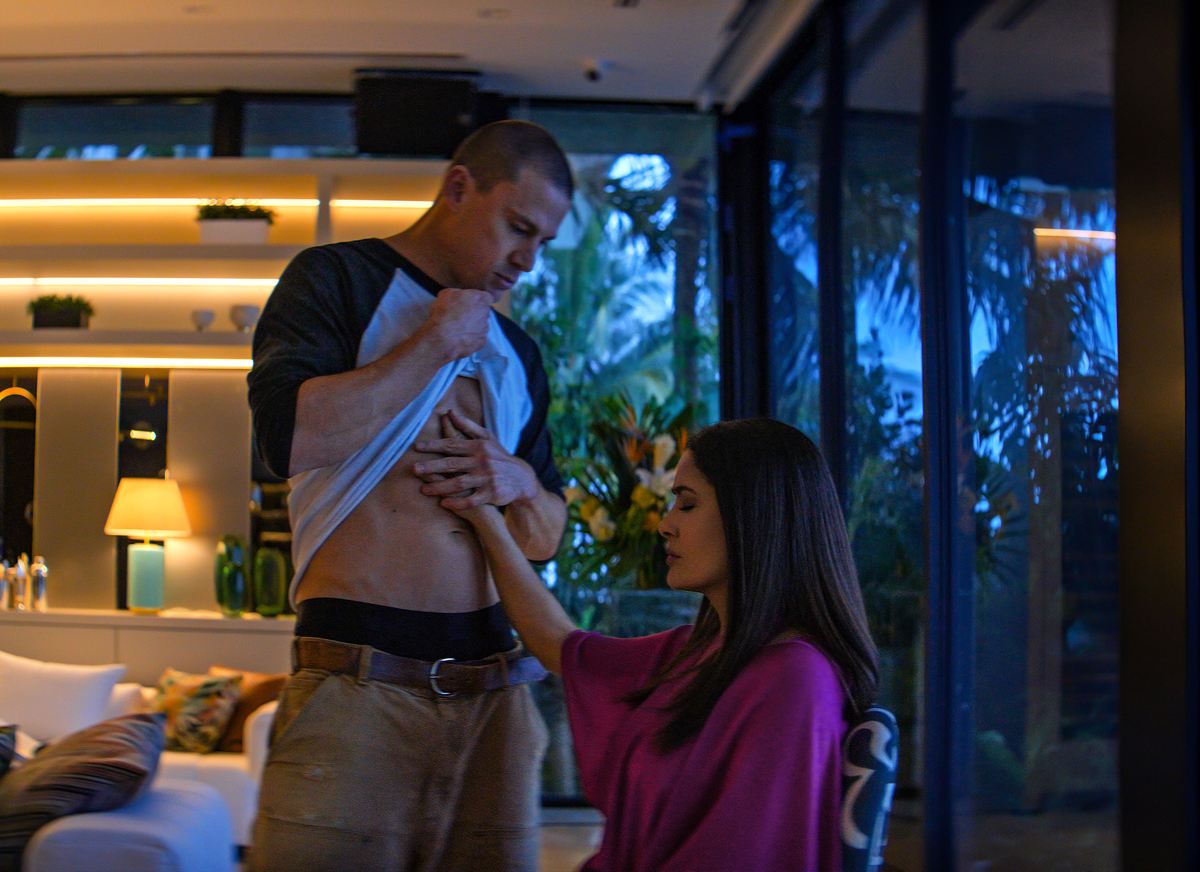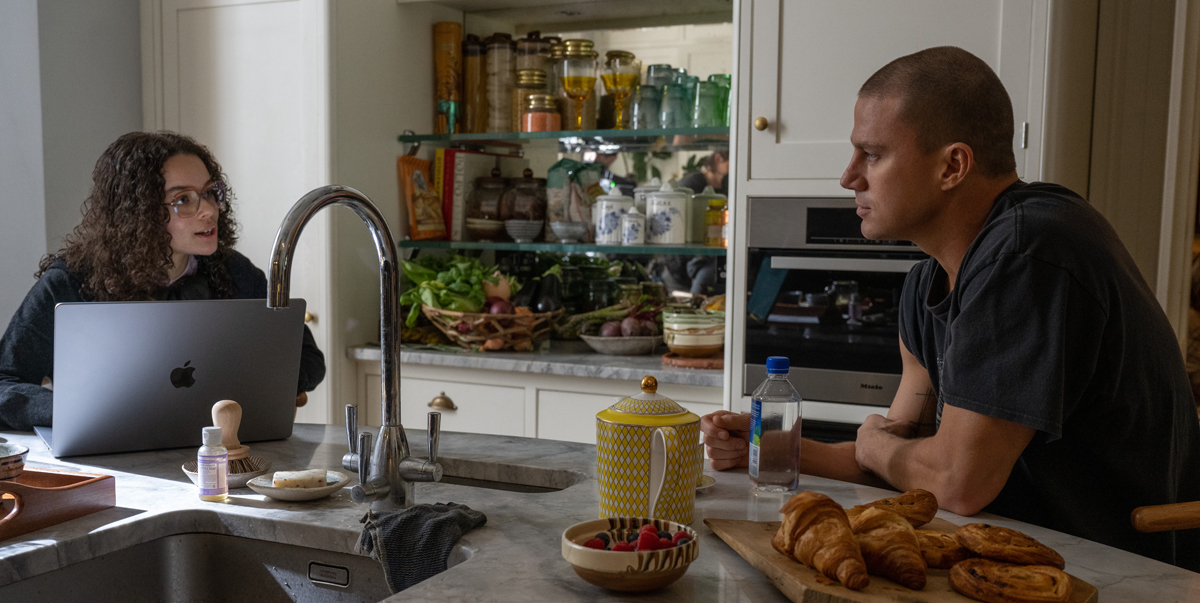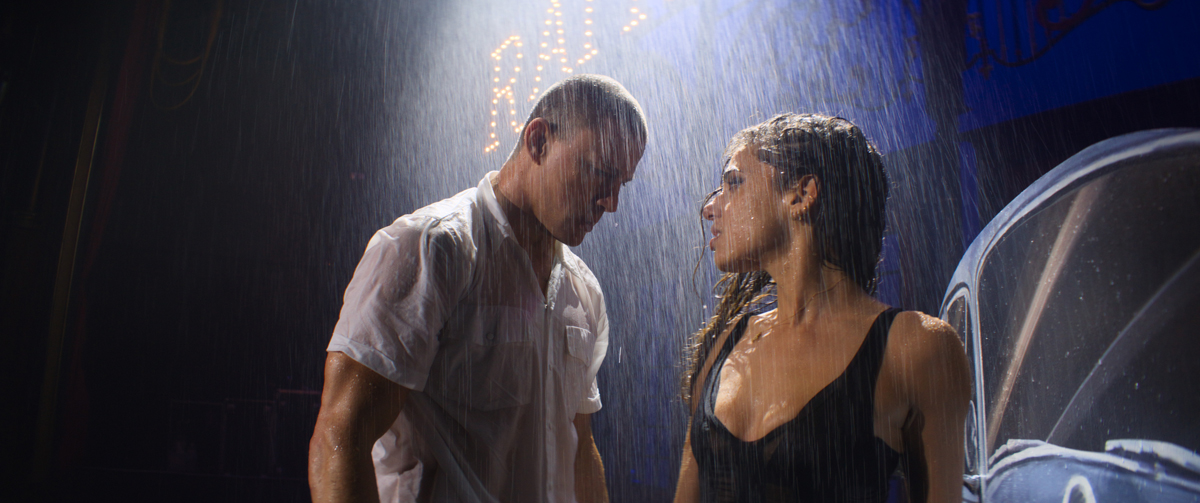 Andrew Chan
Andrew Chan
Back with a new lady, but not anyone’s sugar baby.

Salma Hayek Pinault as Maxandra Mendoza and Channing Tatum as Mike Lane in Magic Mike’s Last Dance. Courtesy Warner Bros. Pictures. © Warner Bros. Entertainment Inc.
Magic Mike’s Last Dance, directed by Steven Soderbergh,
now playing in theaters
• • •
Magic Mike fans know to expect goofy, prop-festooned displays of physical dexterity from the franchise, but the best scene in the latest and final installment pares that formula down to a few old-fashioned elements: a woman, a man, and a chair. While mounting a new strip show at a theater in London, male-entertainment impresario Mike Lane (Channing Tatum) watches one of the members in his troupe practicing a lap dance that, despite its technical competence, lacks heat. A teachable moment has presented itself. Demonstrating how the deed should be done, Mike emphasizes the crucial bits of foreplay his underling left out, chivalrously kissing his scene partner’s hand, maintaining eye contact, and teasing her with caresses before delivering a few bone-rattling pelvic thrusts. The rehearsal session may revolve around a heterosexual pas de deux, but its intimacy derives from the bond forged among a bunch of dudes paying rapt attention to how each of their bodies moves. By bringing nuances of showmanship into focus, the scene captures what makes the Magic Mike movies so justly beloved. These films understand that dance confers discipline and structure on the messiness of real-life sex, turning the art of being a good lover into something like an acquirable skill.

Channing Tatum as Mike Lane in Magic Mike’s Last Dance. Courtesy Warner Bros. Pictures. © Warner Bros. Entertainment Inc.
Mike is a master of that art, and yet he’s never had much use for its most idealized manifestation: long-term monogamy. In the previous films, his lady friends (played by Cody Horn and the captivating Jada Pinkett Smith) were even more love-shy and worldly-wise than he was. To the trilogy’s detriment, Magic Mike’s Last Dance chooses to regard his booing-up as the ultimate, inevitable pursuit. His male apprentices never become anything more than ciphers, and Mike’s burgeoning partnership with them—so tantalizingly foregrounded by that lap-dance tutorial—remains an untapped source of drama and pathos. Instead, the film prioritizes Mike’s new lover, Maxandra Mendoza (Salma Hayek Pinault), who stumbles upon him working as a bartender at a charity event she’s hosting in Miami. Having gotten wind of his carnal credentials, she offers him $6,000 in exchange for a fun time that could take her mind off her yet-to-be-finalized divorce. “You move like water,” she murmurs in Spanish as they spoon in bed, worn out from an evening of calisthenic exertion. And just like that, the film endeavors to transcend its transactional premise. Mike has found someone who believes in him—a Pygmalion who can mold him into the auteur of his own theatrical production.

Channing Tatum as Mike Lane and Salma Hayek Pinault as Maxandra Mendoza in Magic Mike’s Last Dance. Courtesy Warner Bros. Pictures. © Warner Bros. Entertainment Inc.
Compared to the camaraderie our hero shared with his bare-assed bros in Magic Mike and Magic Mike XXL, his path to love is a joyless, sparkless affair. As much as those earlier movies offered a utopian vision of pleasure as an equitably distributed resource, they also constituted one of cinema’s sincerest celebrations of a specific genre of friendship—the kind that forms between coworkers. Mike and his stripper buddies understood the gifts in their collective possession, and their scrappy performances thrived not just on the excitement of their horny patrons but on the admiration they could elicit from one another. Magic Mike’s Last Dance is so conspicuously lacking in homosocial fellowship that its heteronormative agenda feels perfunctory, a plot device meant to distract us from what we all know is missing. As we soon learn, settling down would require Mike to permanently relocate to this movie’s dreary version of London, accept the fate of being an idle socialite’s plaything, and endure the daily death-glares of her imperious butler and disdainful teenage daughter. Homeboy looks bored by the prospect.

Jemelia George as Zadie Rattigan and Channing Tatum as Mike Lane in Magic Mike’s Last Dance. Courtesy Warner Bros. Pictures. © Warner Bros. Entertainment Inc.
Alongside this tepid attitude toward conventional romance, another sort of ambivalence arises: Mike’s own hesitation about reviving his exotic-dance career, and his uneasiness about Maxandra proclaiming him a “visionary” to anyone within earshot. It’s not a question of whether he’s got the goods: when duty calls, he can still bump, grind, pop, and lock up a storm. But just as he is in love, Mike is a commitment-phobe when it comes to his vocation. This may be the only aspect of the movie that bears its director’s personal signature. Steven Soderbergh, who helmed the first Magic Mike film and executive-produced the second, has spent the past decade building a myth around himself as a reluctant artist, intimating that he’ll retire early (as he did briefly in 2013), but allowing himself to be drawn back into the ring again and again by a compulsion he just can’t shake. Several of the most indelible protagonists in his oeuvre are preternaturally proficient at what they do but conflicted about whether they should keep doing it. Like those characters (and the man behind the camera), Mike regards his profession with a mixture of delight and indifference, even if he was clearly born to dance.

Still from Magic Mike’s Last Dance. Photo: Claudette Barius. © Warner Bros. Entertainment Inc.
Soderbergh, Tatum, and screenwriter Reid Carolin seem to be scrounging around for some gravitas to elevate a project that has little apparent reason to exist (except as an advertisement for the live Magic Mike show, which reopened in Las Vegas in 2021). The first two films lent themselves to discussions about an array of social issues—the rigors of the post-recession gig economy, the evolving codes of cis-hetero masculinity—without ever feeling topical or heavy-handed. Through Tatum, one of the few truly charismatic stars left in Hollywood, the series created a persona of a straight white working-class man who could soak up the influence of Black and queer aesthetics without coming across as a try-hard or a cultural thief. Magic Mike’s Last Dance isn’t nearly so silky-smooth in its politics, serving up catchphrases about systemic inequality and female empowerment that have all the persuasiveness of corporate DEI jargon. As with the movie’s rom-com contrivances, these leaden attempts at progressive commentary suggest the frenzy of filmmakers scrambling to get something ready for showtime.

Channing Tatum as Mike Lane and Kylie Shea as Ballerina in Magic Mike’s Last Dance. Courtesy Warner Bros. Pictures. © Warner Bros. Entertainment Inc.
In the past I’ve wondered if the Magic Mike franchise would ever find a way to acknowledge that not everyone is turned on by a swole physique. I now realize that’s beside the point: muscles are a metaphor for aspirational striving, an index of the myriad forms of labor that go into achieving peak hotness. Two tour-de-force numbers in Magic Mike’s Last Dance showcase Tatum—who, in interviews, has bemoaned the difficulty of staying in shape in his forties—in all his corporeal glory. The first begins with Hayek Pinault placing her hand on his washboard abs as though they were a stack of Bibles. The second finds him joined by another female performer in a routine that demands visibly perilous multitasking: sliding across water, bouncing off poles, tearing off clothing, frantic humping. Nowadays, these libidinal extravaganzas barely merit an R rating. What’s striking is their elegiac quality, born of the knowledge that we can’t expect Tatum to pull off these virtuosic feats forever. The athletic prowess documented in these scenes, and the casual glee with which Tatum executes every move, are hard-won—a fact made all the more obvious by the lackadaisical material surrounding them. The film may be a flabby package for such odes to the human body, but occasionally I was dazzled enough to not take this last go-round for granted.
Andrew Chan is a writer and editor based in Brooklyn, New York.